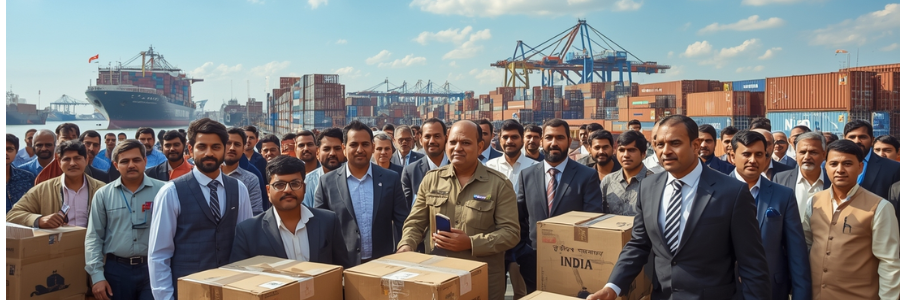Case Study: How RCMC Registration Helped a Textile Exporter Access EPC Benefits?
To uplift the Indian textile industry, the Indian government is continuously working to support the textile industry. Well, in this case study, we will focus on how the RCMC certificate for the textile industry focuses on business growth, government schemes, and incentives. Stay with us until the end!
1. Introduction
The Indian exporters are largely involved in the textile industry. To grow their business in global markets, they seek to join relevant Export Promotion Councils (EPC) to get support. The EPC membership allows textile exporters to obtain the RCMC certificate online. Through the RCMC registration, exporters are eligible to avail the export incentives or benefits in India. The Registration-cum-Membership Certificate (RCMC) is the primary document to be legally eligible for government schemes. In today’s case study, we will explore how the specific EPCs help the textile exporters through schemes such as ‘ Export Promotion Capital Goods (EPCG) scheme and others.
For better clarity, see this blog – Importance of EPC Registration
2. What are the RCMC Requirements for Textile Exporters?
Before obtaining the Registration-cum-Membership Certificate (RCMC), the export business is required to meet the specific requirements. For the RCMC registration for textile export, your primary need is to classify the main line of business. Also, gathering the necessary documents is a major requirement for claiming government benefits. Ensure whether you are dealing with cotton textile, garment textile, manmade & technical textile, or other. It will help you choose the right Export Promotion Council (EPC) that focuses on a specific business line.
Here is the complete list of all EPCs that promote the specific textile industry:
|
EPC (Export Promotion Council) Name |
Role |
|
Apparel Export Promotion Council (AEPC) |
This EPC promotes and manages the production of Indian ready-made garments |
|
Cotton Textiles Export Promotion Council (TEXPROCIL) |
It majorly manages and promotes cotton textiles, including home textiles, fabrics, yarns, and many more. |
|
Handloom Export Promotion Council (HEPC) |
The handloom products, such as furnishings, fabrics, and floor coverings, are promoted by HEPC. |
|
Indian Silk Export Promotion Council (ISEPC) |
The natural textile products, such as fabrics, silk yarns, and garments, are promoted and managed by ISEPC. |
|
Manmade and Technical Textiles Export Promotion Council (MATEXIL) |
This EPC, formerly known as the Synthetic & Rayon Textiles Export Promotion Council (SRTEPC), is responsible for promoting the man-made fibers and technical textiles. |
|
Carpet Export Promotion Council (CEPC) |
It is responsible for managing the handmade textile, such as carpets, rugs, and other floor coverings. |
|
Powerloom Development & Export Promotion Council (PDEXCIL) |
It supports the power loom industry, which works for fabrics and made-up goods. |
|
Wool and Woollens Export Promotion Council (WOOLTEXPRO) |
It promotes the Indian woolen textile export in international markets. |
2.1 Types of Government Schemes for RCMC Textile Exporters
The textile holders who hold the RCMC certificate can avail themselves of the various government schemes and incentives under the Foreign Trade Policy (FTP). But the scheme depends on the exporter’s requirements. Let’s understand it via an example:
Example 1: If you are looking for financial support and tax benefits, you can claim these schemes with an RCMC certificate:
- RoDTEP (Remission of Duties and Taxes on Export Products)
- RoSCTL (Rebate of State and Central Taxes and Levies)
- Duty Drawback Scheme
- Interest Equalization Scheme (IES)
- Production Linked Incentives (PLI) Scheme
- Market Access Initiative (MAI) Scheme
Example 2: There is a business that is active in the textile industry in India and wants to be supported via a scheme for capital and technology; then it can access these schemes:
- Technology Upgradation Fund Scheme (TUFS)
- Export Promotion Capital Goods (EPCG) Scheme
- Mega Cluster Scheme
Example 3: If a textile exporter is looking to claim the price subsidy on yarn, they can apply for the Raw Material Supply Scheme (RMSS) with an RCMC certificate for export. If you want to promote handloom clusters, seek the Handloom Cluster Development Scheme.
3. What is the EPCG Scheme?
EPCG Scheme stands for Export Promotion Capital Goods Scheme. By availing this scheme with the RCMC registration process, the exporters can import the goods at zero customs duty. With zero customs duty, you can produce goods and services for export. The major aim of introducing this scheme was to minimize the cost for exporters, which is additionally required during pre-production. The major benefits of the EPCG Scheme for textile exporters are
- Minimizes Additional Cost
The exporters are required to pay additional costs for imported goods such as machinery and equipment. But with RCMC, which allows for EPCG scheme-eligible exporters for zero customs duty. It means you are not required to pay for raw imported goods, such as equipment and machinery, to produce goods for export to other countries.
- Boost Competitiveness
With the zero-cost-effective benefit, the exporters can easily deal in competitive markets and enhance their textile business credibility.
- Flexibility
The EPCG scheme offers a wide range of benefits, including flexibility in managing capital goods. The scheme covers plant goods and machinery, computer systems and many more.
4. Meet the Textile Exporter: A Real-life Example
To solve your case-study topic, we can understand the introduction with a real-life example. To experience the real-life textile exporter journey, we can take the story of Vatsal Exports. This is an Indian-based textile export company. The journey of Vatsal Exports started with a yarn trader that expanded to become a global supplier.
4.1 The Public Profile of Vatsal Exports
The journey of Vatsal Exports textile company was not easy, as it started with small steps to grow significantly. In their journey, the Registration-cum-Membership Certificate (RCMC) plays a major role. Vatsal Gaudani is known as the founder of Vatsal Exports LLP. This export company is located in Ahmedabad, India. The major business line of Vatsal Exports is to manage the high-quality cotton yarn, which is exported to international buyers. To grow their business in global markets with low or zero cost, Vatsal Export LLP registers with “The Cotton Textile Export Promotion Council (TEXPROCIL). Now, for the RCMC registration, the textile exporters can use the common digital platform Directorate General of Foreign Trade (DGFT).
4.2 Vatsal Exports LLP Journey with RCMC
The Vatsal Exports company received valuable support with the RCMC certificate for export. The major purpose of the Registration-Cum-Membership Certificate is to grow the business and support its main business products in global markets. Here is how the Vatsal Exports company used the RCMC for their products:
- Initial Business Setup: Before starting the export business, the Vatsal Exports Company first obtains the Import Export Code (IEC). With the main line business selected, the corresponding Export Promotion Council (EPC), such as TEXPROCIL, for cotton textiles.
- Claim for Benefits: With the Registration-Cum-Membership Certificate (RCMC), the export business claims government benefits and incentives. It helped them to compete in international markets.
- Expand Business in Market: With the incentives and government benefits, the company lifted its manufacturing scale and expanded its business into a wide range of markets and international buyers.
- Sustaining Growth: With the continued use of the RCMC certificate, Vatsal Exports LLP has improved its business credibility through the EPC membership. The market intelligence and other support enhanced business and sustained international growth.
Final Discussion | The RCMC Certificate helps Exporters to Grow
For the sustained growth in global marketplaces, the textile export business requires specific EPC support. In India, the textile exporters leverage EPC membership to claim benefits. The Export Promotion Councils (EPC) issue the RCMC registration certificate for export, which allows eligible businesses to participate in international trade events. Through the specific EPC membership certificate, businesses get information on market intelligence and current goods trends. By understanding the real-life exporter journey, you can choose the right support. For a quick and straightforward RCMC registration to unlock chances for growth and innovation, please consult a professional, or please go to LegalRaasta.com for assistance.










